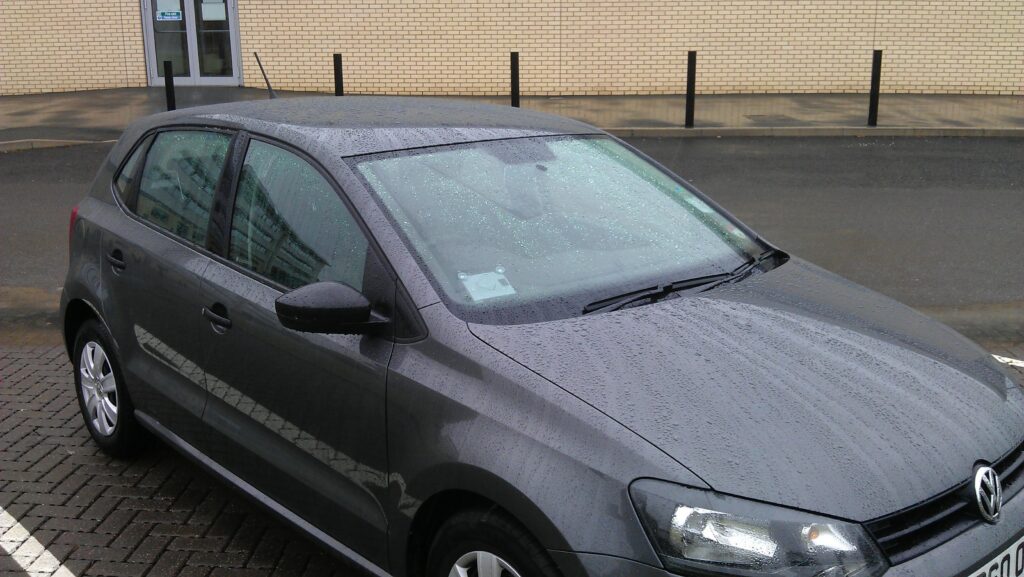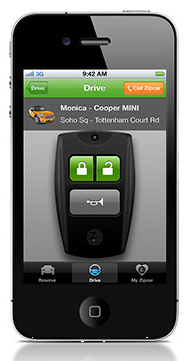Recently, I wrote about the fact that I’m driving to and from Aylesbury once a week in order to study there. I passed my driving test a year and a half ago, but, of course, I don’t actually own a car. What I’ve been doing is using a car sharing company called Zipcar (technically, Streetcar, when I started, but the latter is merging into the former).

There are two varieties of car sharing clubs. These are:
- Ones like Zipcar, which are companies with a large fleet of vehicles, pre-vetting of customers, and “live”/”on-demand” booking.
- Ones like WhipCar, which act as portals to allow members of the public to borrow one another’s privately-owned cars.
I haven’t had the chance to try the latter variety yet, although there are a number in my area. The important things are the things that both types have in common, and that is distinctfrom most traditional car rental companies:
- They keep their fleets spread out in disparate locations, meaning that you don’t have to “go somewhere” to pick up a car.
- They make heavy use of the Internet, mobile apps, and – in the case of the corporate varieties – remotely-managed engine computers and RFID technology, to give their members access to vehicles.
- As a result of the above, they cater in particular to people who want to borrow a car occasionally, conveniently, but only perhaps for a few hours at a time.

For me, at least, it’s far cheaper than owning a car – I only make one journey a week, and sometimes not even that. It’s far more convenient for that journey, for me, than public transport (which would involve travelling at awkward times and a longer journey duration). If I were using my own car, I’d have to park it in Oxford city centre on Mondays in order to make my journey possible (which is as challenging as it is expensive). Paying by the half-hour makes it convenient for short hops, and the ability to book, pick up, and return the car without staff intervention means that it doesn’t matter if it’s midnight or a bank holiday or anything: if I ever need access to a car or van in a hurry, there’s almost always one available for me to just “swipe into”.
And it’s far simpler than a conventional car rental company… at least, once you’ve gone through the telephone set-up process: a three-way phone call between you, the DVLA, and the car hire company. If I want a car, I pop up the website or pull out my phone, find a nearby one that’s free when I want it, and go drive.

The cars are all new and well-kept, and the pricing is reasonable: you get a daily mileage allowance (now 40 miles, which is pretty ideal for me, as my round trip journey is barely more than that), and then pay a mileage rate thereafter (if you need to fuel up, there’s a fuel card in the car). Paying by the mile, rather than the litre, has the unfortunate side-effect of failing to encourage eco-driving, but other than that it’s a sensible policy which allows you to accurately anticipate your costs.
It’s been great, so far. I’ve been doing it for a few months and I’ve only had one niggle: I was on my way to college, as usual, when Zipcar called me to let me know that the previous person booking my car was running late. I’d never had this happen before: I’d never even been lined up back-to-back with another user before; it actually seems to be quite rare. In any case, Zipcar found me another car, which I declined (it was on the wrong side of town, and by the time I’d cycled back to it and driven across to this side again, I might as well have waited). In the end, the other user was fined, and I was given a discount in excess of the “missed” time, which I spent on a tin of biscuits to share with my classmates by way of apology for turning up late and disrupting the lesson. I’ve had a few difficulties with their website, especially when they first started taking over Streetcar’s fleets, but they’ve been pretty good about fixing them promptly.
So there we go: a nod of approval for Zipcar from me. So if you’re based in London (where there’s loads of them), Brighton, Bristol, Oxford, Cambridge, or – soon –
Maidstone, Guildford, or Edinburgh, and occasionally have need for an on-demand car, look into them. And if you sign up using this link or the shiny button below,
we’ll each get £25 of free driving credit. Bonus!
Update (2022): Many years later, ZipCar would come to start mis-charging me and then repeatedly fuck up my
requests for them to stop doing so and stop processing my personal information (they actually told me twice that they’d done the latter, and I needed to log into my account to produce
screenshots for them with which to demonstrate that they were lying to me). As a result, I can’t give them the same level of glowing recommendation as I used to.
Update (2023): Somehow, ZipCar are still fucking-up my personally-identifiable information, despite
repeatedly being told to delete it (and on several occasions promising that they would or had). I can no longer in good faith recommend them as a company. Please don’t use them.
how much /day does it work out at?
I’m paying just under £30 a year membership on account of my academic associations; it’s usually a little higher. I’m also opting to pay £10 per month in order to reduce my excess in the event of an accident, but that’s not mandatory (or you can pay a little more and remove the excess completely). Each trip then costs me about £25 to £30, which “feels” expensive (based on my mental model that “it doesn’t cost £30 to get to Aylesbury and back!”), but of course I’m NOT having to pay for the other costs of running a car, such as owning, maintaining, taxing, MOTing, etc. Nor am I paying for fuel, as that’s all covered too.
If we divide the total cost (assuming the upper value of £30 each trip) by the number of college trips I expect to make over the academic year, we get a grand total of £34.17 per trip. It’s complicated, because if I were to take more trips, the average cost of each would decrease as the membership and insurance-reduction costs became a less-significant part of my outgoings… but then, if I were regularly driving twice or three times per week, then it might be worth me owning a car instead! Zipcar is the best-value solution for me specifically because I only travel once a week, or so, and it comes with a few extra perks (cars when I need them, where I need them; doing good for the environment; nice shiny new vehicles) to help make up for the few minor downsides (won’t be able to amass no-claims bonuses; could conceivably be unable to get a car when I want one).
ouch, no no-claims? thats gonna really hurt if you ever have to insure a car…
My car costs me about 35/week including tax/mot/ins./repairs… if I make lots of long trips its a bit more.
Shiny new vehicles arent necessarily any better for the environment than older ones, either, esp. when you factor in the [environmental] cost of replacing them when they start to look a bit shabby (as these inevitably will, given the company will have an image to uphold / remain competitive). I guess good maintainence [relative to some owners] will offset that a little.
All in all, not good enough. Yet.
Thanks Dan, interesting to hear your overview. About to launch my ‘Lifestyle key card’ in Newcastle which gives free car club membership and first day use (and free street bike use and lots of discounts from various stuff) for those signing up for my bus Smartcard by monthly direct debit. Hope to add taxi account with discount and rail too in due course for a transport ‘bundle’ based on a single Smartcard which the purchaser manages on-line on their web account. Maybe I am bonkers but want to try a completely new approach to selling transport!